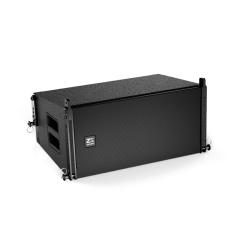Considerations for DJs Selecting Professional Speakers, one of the main components used in specifying DJ sound systems to provide peak performance and dependability. Power output is another major consideration. Speakers for DJs must have enough wattage to fill the space with even higher sounds in case of middle PB acoustics. In small to mid-sized venue settings, 500-1000 watt RMS powered speakers are generally sufficient for the task and give enough headroom necessary to keep sound clear and free of distortion at high volume. More massive venues or open spaces may require 2000+watt systems to give enough powerful, crystal clear sound at a wider range area.
Frequency response is another important criterion. DJs would want to get speakers with just as wide a frequency range really, between 20 Hz and 20 kHz at the very least in order for all components of their music are reproduced faithfully. This is especially useful for genres where having heavy bass is a staple like in EDM and hip-hop. Subwoofers that go down to 20 Hz or even lower can produce the deep, rattling basslines needed for those sounds to resonate loud enough so as media (audio and visual) is maximized.
Mobile DJs that are known for constantly switching venues require portability and durability which is a necessary. The most durable portable speakers are constructed from lightweight materials like high-density plastic or plywood. For events that have a tight schedule, integrated handles, wheels and compact designs could mean the difference between being able to set up before guests stars arriving or not. The JBL PRX800 series, for instance, is famous not only for their steadfast construction but also practicality as most professional DJs find it adaptable and exceptionally portable.
The number one most important is sound dispersion. For the best results, I recommend that DJs select a system like this which has controlled dispersion patterns fitted to your venue. Most often this will correspond to a speaker with 90-degree horizontal and 60 degree vertical dispersion, giving enough spread so you don't excite too much reflection off of walls or ceilings which makes it hard for our brains to decipher the echo that results. The use of line array speakers are most common for large venues as they provide the means to control both vertical dispersion with wide horizontal coverage giving an even sound throughout audience zone.

Connectivity options – Integrating these speakers to the DJ should be an option a well, so cables ports are here as they belong. A good studio speaker should have several input choices viz XLR, TRS or RCA connections, catering to various mixers, controllers and playback devices The ability to stream wirelessly from mobile devices via Bluetooth is also useful for wireless connections on-the-go during events. Some models, like the Yamaha DZR series include a wide range of connectivity options from digital inputs on top to ensure that DJs can connect any source effortlessly.
The bottom line is; budget and ROI! Premium speakers can get a little pricey, but they usually feature better sound and are more durable that in turn adds to the performance as well your image. The solid speakers will be viable for long haul and one could wind up saving a fortune of cash as the incessant fixes and substitutions cause weakenments in your pocket. For instance, paying $2,000 for an excellent speaker system that lasts you a full decade is better than buying a low-cost stereo totaling about $1.001 and replacing it every several years:
Scalability and easy customization is also necessary. DJs should ask whether the speaker system can be expanded or modified to accommodate different events. A modular system that accommodates more subwoofers or satellite speakers, such as one of those from the 'Best Big PA's' Pitch may serve well for small club gigs and large outdoor festivals. The system can be scaled to the size of event, so Fenwick is able to provide optimal sound no matter if her DJ's 1:30pm set time means they'll be playing on The Courtyard area or She Wants Revenge (or DeadMau5) in Grove.
If you are a professional DJ then your first priority will be sound quality. One of the most well-known DJs in house music history, Carl Cox has a popular phrase that states “Sound is everything.” Engaging the audience and keeping them on their feet requires some powerful sound systems that also feature high-quality speakers to deliver clear, punchy audio that does not crack at higher decibels. It needs to be reliable also: equipment failure when you have a set in front of hundreds, maybe thousands of people is always going to make things difficult. It is wise to select brands or models, which can be trusted for durability and performance.
In simple terms, the considerations for a DJ to keep in mind when selecting any of these dj professional speakers include power output, frequency response range and accuracy, portability options – size actually matters here!, sound dispersal patterns traits (depends on use cases), connectivity capabilities provided upfront considering that not all connectors will be included out-of-the-box with each unit shipped by default as well budget being important alongside must-have features which can also come at an additional cost from some manufacturers give take into account what you do best while making decisions based off verdicts offered). With these factors in mind, DJs will be able to choose a set of high-quality and durable speakers that not only meets their requirements today but are also future proofed for many years of continued success in the industry.